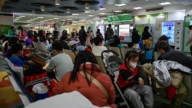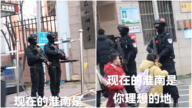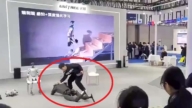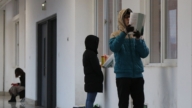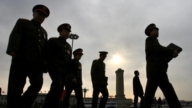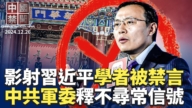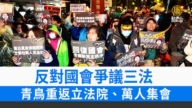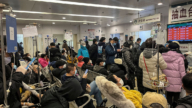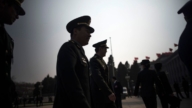【新唐人2011年6月1日讯】内蒙古大规模抗议示威持续已有十天,中共当局加派大批全副武装的军警,在呼和浩特、通辽、赤峰等内蒙各主要城市戒严,封锁街道、大专院校和网络通讯。外界舆论指出,中共对少数民族长期实行掠夺和灭绝政策,多年造成的民众积怨靠武力是压制不住的,反而会激化。
锡盟西乌旗牧民莫日根因阻拦在大草原上采矿、而被运煤车轧死后,蒙古族民众抗议示威持续扩大,并透过网路发起5月30号“蒙族历史英雄纪念日”大游行。
当天,中共当局加派2千名武警封锁大学区,呼和浩特市区出现大批荷枪实弹的武警,手持盾牌和警棍巡逻,封锁新华广场、成吉思汗广场等主要广场和街道,市中心停有多辆防暴装甲车。
当地居民手机不断收到公安局警告集会非法的简讯。还有居民透露,所在单位开会威胁“谁上街就开除”。
内蒙古消息人士:“各大院校都戒严了,不准外出,武警出动,把着学校门口,不让学生出来,怕学生们出来游行。市政府、内蒙政府都把上岗了,消息都封锁了,不让你动,这两天一直就上不了网。”
“南蒙古人权信息中心”主任恩赫巴图表示,有约1千名牧民冲破封锁,30号上午11点多举着标语,喊着口号,到市中心抗议示威,要求释放27号在正兰旗抗议中被逮捕的近40名牧民,示威持续了近一个小时,又有几十名牧民被抓。
《博讯网》引述消息说,曾参与六四镇压的解放军第38军,已经从驻地河北保定调往内蒙。这个未获证实的消息,引起外界关注。
31号,当局在内蒙各个城市进一步部署警力,并向学生发出了宵禁通知。中共外交部发言人31号首次对内蒙示威表态,表示将严厉打击制造事端者。
另一方面,中共也采用收买和安抚的手法,试图平息蒙古族人的愤怒。30号,当局出台改善内蒙矿区生态和居民利益等措施。
内蒙古自治区党委书记、素有“小胡锦涛”之称的胡春华,27号到西乌旗与教师和学生交流,他承认造成人命伤亡的事件“性质恶劣、民愤极大”,承诺将严惩罪犯,并表示要“处理好矿产开发与群众利益的关系”。
恩赫巴图(南蒙古人权信息中心主任):“他这很难安抚蒙古人的愤怒和不满,因为蒙古人在自己的土地上受欺压很长时间。胡春华的这种承诺,到底能不能按他承诺的这样做,这也是一回儿事。”
当局27号罢免了西乌旗党委书记海明的职务,并将扩大中等学校“免学费、免书费”的范围。南蒙古人权信息中心说,死者莫日根的家人将获得房子和60万元的赔偿。
流亡德国的“保卫内蒙人权同盟”主席 席海明:“内蒙的问题现在不是说一个牧民被轧死了这么简单,它主要是蒙古人整个生存危机,整个草原被破坏了。世界90%多的稀土在中国,中国99%(的稀土)在内蒙。现在高干子弟拿着军队的批发权在那儿挖,以国家的名义。蒙古人最后没有生计了,没有活路了,最后剩下草原,有个草原法它又不保护。”
内蒙古自治区是中国最大的产煤区。2010年,内蒙古经济增长速度以14.9%位居全国第四,跻身“GDP万亿俱乐部”。但这不仅没有给牧民带来好处,反而使草原遭到严重的破坏。
在美国的前中国佛教协会副会长、全国政协常委、青海省政协副主席阿嘉仁波切喇嘛说:“在内蒙,有大量的内地的移民,近期加上大量的开发,对环境保护和少数民族文化的侵蚀,非常非常的厉害。那么这样人们没有办法了以后,就有一句话说,人不反,官逼着反(官逼民反)。”
蒙古国、美国、德国、英国、法国、瑞典、日本、澳大利亚等地,30号举行各种抗议活动声援内蒙。中国过渡政府写信给美国总统、欧盟主席及联合国秘书长,呼吁阻止中共对内蒙民众的镇压。
新唐人记者李元翰、周平综合报导。
Inner Mongolia Tension Escalates
Ten days after large-scale protests broke out
in Inner Mongolia, Chinese Communist Party (CCP)
dispatched a large number of armed forces
to exert martial law in the major cities,
block streets and intensify Internet censorship.
Comments from overseas point out that the CCP’s
plundering and genocide policies on minorities cause
mounting public grievances, difficult to suppress.
After Mongolian herdsman Mo was struck and killed
by a coal vehicle for his defiance of mining
on Inner Mongolian grasslands,
people online were calling for a march on May 30,
while protests continue to grow.
2000 armed police were dispatched to block
the university district. Armed police with shields
and batons in hand appeared in downtown Hohhot,
blocking Xinhua Square and Genghis Khan Square.
Several anti-riot tanks appeared in the city center.
Local residents often received police text messages
saying that it is illegal to rally. Some employers
threatened to fire employees if they joined the rally.
Inner Mongolia Resident: “All colleges are under
curfew. Armed police blocks the campus entrance
to prevent students from leaving for a rally.
The CCP has blocked all information.
Internet is disconnected for two days now.”
Enghebatu, director of Southern Mongolia Human
Rights Information Center, said that 1000 herdsmen
broke through blockades to protest in the city center
with banners and slogans, requesting the release
of 27 people arrested on May 27. The protest lasted
about 1 hour; several dozen herdsmen were arrested.
Boxun Network said that the 38th Army of the PLA,
which participated in the Tiananmen Massacre,
has been deployed from their base in Hebei
to Inner Mongolia. This news sparked wide concern.
On May 31, the authorities continued to deploy
police forces in various cities and informed students
of a curfew. The foreign affairs spokesperson said
the that CCP would severely crack down
on those who cause problems.
The CCP also used soft methods to try and calm
Mongolians. On May 30, authorities announced
new policies to improve the ecology and residents’
well-being in the Inner Mongolian mining area.
Hu Chunhua, Party secretary of Inner Mongolia,
nicknamed “Junior Hu Jintao”, visited local teachers
and students on May 27. He acknowledged
the malicious nature of the incident. He promised
to punish the perpetrator and balance relationships
between mining development and local resident.
Enghebatu: “It is difficult for him to pacify
the long-accumulated anger and grievances
over their land. It is still dubious whether
Hu Chunhua is able to honor what he promised.”
On May 27, authorities fired the Party secretary
of West Ujimqin Banner, and offered more schools
“Free Tuition, Free Books.” Enghebatu said
that the family of the victim Mo will receive a house
and RMB600,000 as a compensation.
Xi Haiming, exiled chairman of Inner Mongolia
Human Rights League in Germany:
“The problem is not as simple as a herdsman’s death.
It is related to the survival crisis of the Mongols,
because the entire prairie has been destroyed.
Over 90% of world’s rare earth production
is in China, but 99% of it is in Inner Mongolia.
High-ranking CCP officials’ sons control production,
and Mongols are deprived of their livelihood
since the prairie is gone.
The so-called “prairie law” did not protect them.”
Inner Mongolia is China’s largest coal production
area. In 2010, its economic growth rate was 14.9%,
ranked No. 4 in China. Its development did not seem
to bring many benefits to the herdsmen. Instead,
it severely damaged the prairie and their life style.
Former Vice President of the Buddhist Association
of China, Ajia Rinpoche Lama: “The huge number
of immigrants to Inner Mongolia, plus recent
development and damage to the environment
and culture have had negative impacts.
When Mongols cannot see any prosperous way out,
they have no choice but to rebel.”
On May 30, various activities were held in Mongolia,
USA, Germany, UK, France and other countries
to protest CCP’s acts and support Inner Mongolians.
China Interim Government wrote to US President,
EU Chairman and UN Secretary General to urge
the CCP to stop the crackdown on Inner Mongolians.
NTD reporters Li Yuanhan and Zhou Ping


